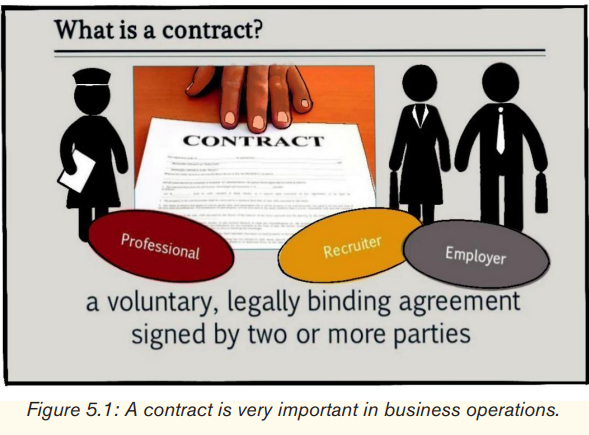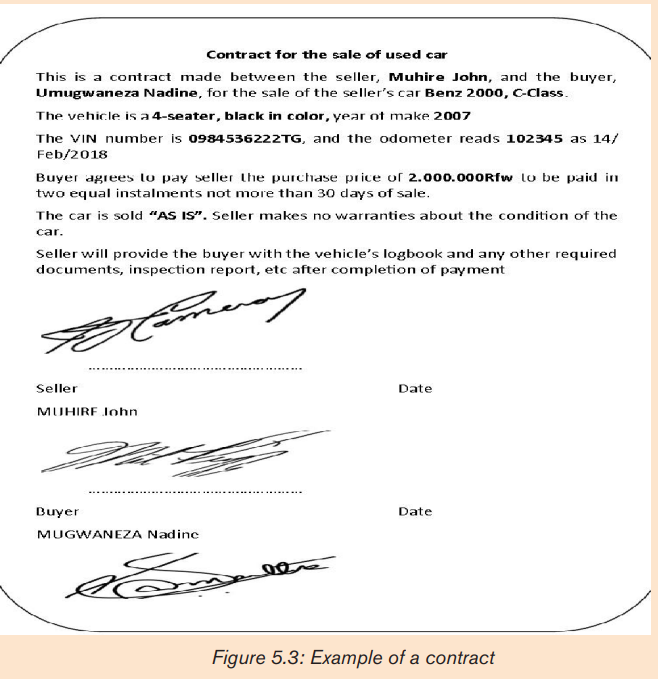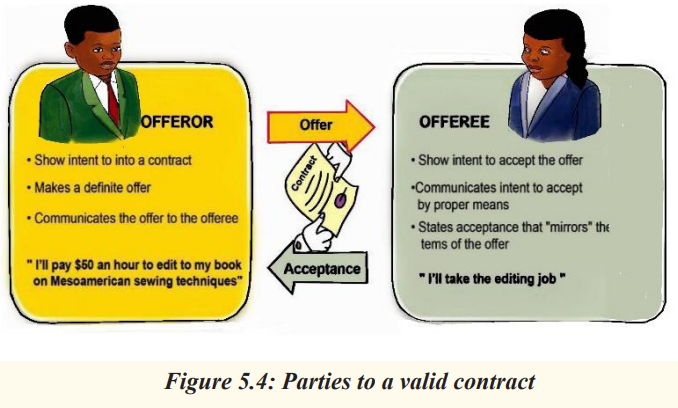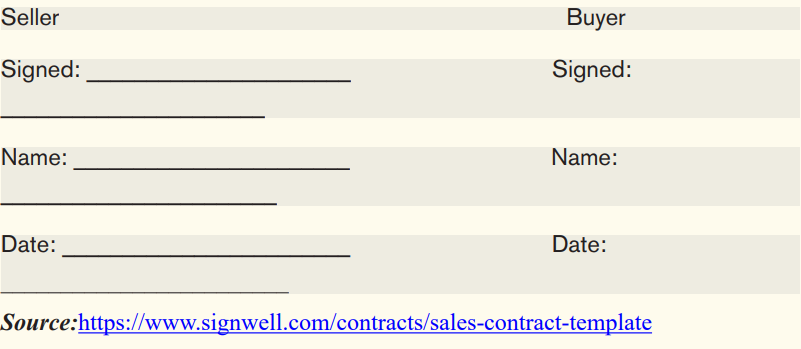UNIT 5: VALID BUSINESS CONTRACTS

Key unit competence: To be able to make valid business contracts in business
operations
Introductory activity
Sam met with a business person at a football ground. The business person
requested Sam to supply him beans at a price of 500Frw per kilogram.
When Sam delivered 200Kgs, he was not paid the full amount of money
they had agreed upon.
a) Has such a situation ever happened to you or anyone you know?
When and what happened?
b) What mistake did Sam make?
c) Assume you were the one in such a situation, what would you do
have done?
d) What advice would you give to Sam and the businessperson?
e) What lessons do you learn from the above situation?
5.1. Meaning and forms of a business contract
Learning activity 5.1:
Bayingana operates a small medium enterprise in Huye and wants Ishimwe
to supply his business with goods. Bayingana tells her to start right away
and supply the goods as they will discuss other issues later. She insists
that she needs an agreement between the two especially on issues of
price, mode of payment, delivery period, quantity and quality, among others.
a) How do you call an agreement that Ishimwe insists to be made
between them?
b) Do you think she is right to have the agreement before starting the
supply of goods? Give reasons to support your answer.
c) In which way/form may the agreement be made between the two?
Support your answer
d) What do you understand by the terms “contract” and “business
contract”?
5.1.1. Meaning of business contract
A contract is a legally binding agreement between two or more parties which
can be enforced by law.
Example:
– In marriage, the woman and man make a contract during civil marriage.
The three parties are woman, man and witness who comes to testifybefore the law represented by Executive secretary of sector.
– Before starting a job, the employer and employee make a contract. In
this case, there are two main parties and the law is now represented
by official labour law because it is not possible to make a job contractwhich is against the labour law.
A business contract is a legal binding agreement between two or more
persons/ entities to perform an agreed business transaction and can be enforced
by law. Today, running a business involves making contractual obligations withsuppliers, buyers, consultants, etc.
Example: A farmer can make a contract of supplying chicken to the hotel. In
most cases, this contract is written and two parties should sign it. This contract
should follow the official law like the right person who represents the hotel
and the farmer should have maturity age. The two parties should sign with freeconsent. Once signed, it becomes a document which binds the two parties.
5.1.2. Forms of business contracts
• Oral contract is an agreement between two or more parties by use
of words of mouth (verbally). They are non-written contracts. They rely
on the good faith of the parties but can be difficult to prove. Once thecontract is verbal, the wittiness is mandatory and provides evidence.
• Written contract is a contract documented on paper, signed by thecontracting parties and witnessed by a third person (the witness).
Application activity 5.1
Read the following statements and answer the questions that follow:
i) Nkusi wants to lend his car to Niragire for 20,000Frw per day for five
days.
ii) Niragire agrees with a handshake to borrow the car from Nkusi andpay the money in eyewitness of Rukundo.
iii) Ntezimana promises to take his girlfriend Bagirishya for an outing toLake Kivu.
iv) Niyokwizerwa promises to pay 10,000Frw to whoever finds her lost
phone.
v) Gato puts on paper his commitment to provide printing services to
Umutoni on agreed terms.
vi) Mutesi promises to pay for her brother’s school fees and puts it inwriting.
Which of the above statements are:
a) Contracts?
b) Not contracts?
c) Business contracts?
d) Written contractse) Oral contracts
5.2. Parties to a contract and importance of contracts in business
Learning activity 5.2:
6. Analyse the figure below and answer the questions that follow.

a) Do you agree that the above sample is a contract?
Give reasons to support your answer.
b) Do you think the sample above is a valid contract? Support your
response by mentioning the elements of a valid contract from the
sample provided. (If any?)
2. Describe different parties to a valid contract.
5.2.1. Parties to a valid contract
Parties to contract are persons who can sign the contract. For a contract
to be considered valid, it should include three parties. These are; Offeror/
promisor who makes an offer, Offeree/promisee to whom an offer is madeand Witness who sees an event happening.
For example, in the above template Mr. John Muhire Offeror/promisor agrees
to sell his car to Umugwaneza Nadine Offeree/promisee at 2 million.
Two parties to contract Offeror/promisor and Offeree/promisee must
have “capacity”, legal ability to make valid contract. Assent of parties is a must.
If either party is deprived use of his understanding or deemed by law not have
attained consent, then such an agreement shall not bind him. All parties shouldbe mature, sound mind and qualified for contract by law.
The information of two parties in contract should be clear, complete and
concise. In any case, the names are not enough, it should be better to include
other information like number of identification card, the location where those
documents are issued. Ensure that all information is well reflected on the
contract. For example, in the above contract there is a mistake in writing names.
Umugwaneza Nadine who sells the car is not the same Mugwaneza Nadine whosigns the contract. These slight mistakes can disqualify the contract.
Witness is a person who sees an event happening. In a legal contract, a
witness is someone who watches the document be signed by the person they
are being a witness for and who verifies its authenticity by signing their own
name on the document as well. However, if you have a legal document suchas a mortgage or a Will the chances are that you will want a witness to attest
to your signature. Generally, the person you choose to witness a document
should have no financial or other interest in an agreement. A neutral third partyis the best choice.
5.2.2. Importance of contracts in business
In business life, contracts are important because they outline expectations for
both parties and protect them when expectations are not met. There are so
many relationships that affect the way the business operates such as customers
or clients, employees, suppliers, government, financiers. Contracts are then
important in the following ways:
• Contracts reduce business risks by compelling business partners to
perform what they have agreed to as per contract.
• Business contracts specify terms and conditions of business
transactions including price, quantities, quality, date of delivery, etc.
which avoids misunderstandings.
• Contracts help entrepreneurs to get the goods on credit because the
suppliers are aware that the entrepreneur is bound by contract and
therefore will make effort to pay the agreed amount.
• Written contracts act as evidences. They are important because it is
easy to forget details you have agreed upon verbally and therefore
provide a permanent record.
• Contracts may be used by entrepreneurs to convince bankers that theentrepreneur has a business that will generate income so as to obtain loans.
Application activity 5.2
Demonstrate the importance of valid business contracts to the school businessclub
5.3. Elements/components of a valid contract
Learning activity 5.3:
What key elements of a written contract do you identify in figure 5.2
For a contract to be valid and therefore enforceable by law, it must have thefollowing elements:
• Intention to be bound by the contract: The two parties should
have intended that their agreement be legal. Domestic agreementsbetween husband and wife are not taken as valid
• Offer and acceptance: There must be an offer and the two parties
must lawfully come to acceptance leading to a valid contract. Until an
offer is accepted, it’s not a valid contract
• Consideration/price: This is the price agreed upon by the parties to
the contract and paid by one party for the benefit received or promise
of the other parties
• Capacity of the parties: The parties to the contract must have
contractual capacity for the contract to be valid, i.e. should be sober,
above 18years, not bankrupt, not insane, and properly registered.
• Free Consent: Parties to the contract must agree freely without any of
the parties being forced to accept or enter the contract.
• Legality/lawful object: The object and the consideration of the
contract must be legal and not contrary to the law and public policy.
• Possibility of performance: If the contract is impossible to be
executed in itself either physically or legally, then such contract is not
valid and cannot be enforced by law.
• Certainty: The terms of the contract must be clear and understandable
for a contract to be valid. If the terms are vague or ambiguous, where
even the court may not be able to tell what the parties agreed, then itwill be declared invalid.
Application activity 5.3
Read the following paragraph and answer the questions that follow:
Musoni started a business selling general merchandise in his community. He
buys his goods from a nearby town through a fellow business person. He
says he trusts his friend, so they never write down anything when sending for
goods but just gives him the money. He always sells goods to his customers
on credit but rarely make any record of such transactions. Recently, after
some advice from a friend, he contracted a construction company to buildfor him a two-roomed building where he will shift his shop to.
a) Mention some of the mistakes Musoni is doing in his business
activities?
b) What are the likely consequences of Musoni’s actions mentioned
above?
c) What advice would you give to Musoni to avoid the consequences
above and why?
d) What key elements do you think Musoni has incorporated in hiscontract with the construction company?
5.4. Designing a contract
Learning activity 5.4:
Read the case study below and answer the questions that follow:
Shine Business club
Shine business club wanted 3crates of soda to sell to their school on a
visiting day. Chantal an active member of the club having been close to
Bizimungu an entrepreneur dealing in retail business convinced the club
to deal with him. The club paid him and he agreed to deliver the sodas
to the club after three days, but unfortunately after the agreed time, he
didn’t deliver the sodas as expected. When the club contacted him for
the sodas, he denied to have entered into any dealing with them that if he
did, he would be having at least a formal document to prove that. The club
reported the matter to the school administration, but it couldn’t help themsince it was not notified of that deal.
a) Was there a valid contract in the above case study? Support
your answer
b) What advice do you give to shine business club?
c) How would you approach the situation or the above problem if itwas your business club
5.4.1. Employment contract
An employment contract is an agreement that regulates the employment
relationship between a company and an employee. It allows both parties toclearly understand their obligations and the terms of employment.
Employment contract template:
This contract, dated on the ____ day of ______________ in the year 20____,
is made between [company name] and [employee name] of [city, country]. This contract constitutes an employment agreement between these twoparties and is governed by the laws of [state the law].
WHEREAS the employer desires to retain the services of the employee, and
the employee desires to render such services, these terms and conditions are
set forth.
IN CONSIDERATION of this mutual understanding, the parties agree to thefollowing terms and conditions:
Employment
The employee agrees that he or she will faithfully and to the best of his/her
ability to carry out the duties and responsibilities communicated to him/her by
the employer. The employee shall comply with all company policies, rules andprocedures at all times.
Position
As a [job title], it is the duty of the employee to perform all essential job functions
and duties. From time to time, the employer may also add other dutieswithin the reasonable scope of the employee’s work.
Compensation
As compensation for the services provided, the employee shall be paid a wage
of ___________ [per hour/per annum] and will be subject to a[quarterly/annual]
performance review. All payments shall be subject to mandatoryemployment deductions (taxes for instance).
Benefits
The employee has the right to participate in any benefits plans offered by the
employer. The employer currently offersthese benefits will only be possible after the probationary period has passed.
Probationary period
It is understood that the first [time frame] of employment constitutes a probationary
period. During this time, the employee is not eligible for paid time
off or other benefits. During this time, the employer also exercises the right toterminate employment at any time without advance notice.
Paid time off
Following the probationary period, the employee shall be eligible for the following
paid time off:
• [length of time for vacation]
• [length of time for sick/ personal days]• Bereavement leave may be granted if necessary.
The employer reserves the right to modify any paid time off policies.
Termination
It is the intention of both parties to form a long and mutually profitable relationship.
However, this relationship may be terminated by either party at any timeprovided [length of time] written notice is delivered to the other party.
The employee agrees to return any employer’s property upon termination.
Non-competition and confidentiality
As an employee, you will have access to confidential information that is the
property of the employer. You are not permitted to disclose this informationoutside of the company.
During your time of employment with the employer, you may not engage in any
work for another employer that is related to or in competition with the company.
You will fully disclose to your employer any other employment relationships
that you have and you will be permitted to seek other employment provided
that (a) it does not detract from your ability to fulfill your duties, and (b) youare not assisting another organization in competing with the employer.
It is further acknowledged that upon termination of your employment, you will
not solicit business from any of the employer’s clients for a period of at least[time frame].
Entirety
This contract represents the entire agreement between the two parties and
replaces any previous written or oral agreement. This agreement may be modified
at any time, provided the written consent of both the employer and theemployee.
Legal authorization
The employee agrees that he or she is fully authorized to work in [country
name] and can provide proof of this with legal documentation. This documentationwill be obtained by the employer for legal records.
Severability
The parties agree that if any portion of this contract is found to be void or unenforceable,
it shall be removed from the record and the remaining provisionswill retain their full force and effect.
Jurisdiction
This contract shall be governed, interpreted, and construed in accordancewith the laws of [Country].
In witness and agreement whereof, the employer has executed this
contract with due process through the authorization of official company agentsand with the consent of the employee, given here in writing.
Employee’s signature:
Date:
Company’s official signature:
Source: www.betterteam.com/employee-contract-template5.4.2. Sales contract
A contract of sale is a legally binding document between a buyer and seller. The
document contains the details of the exchange, the terms of sale, clear product
or service descriptions, and more. A good sales contract should leave both
parties in no doubt as to their rights and responsibilities during a transaction.Employment contract template:
Example of a sales contract:
This Sales Agreement (the “Agreement”) is entered into
____________________ (the “Effective Date”), by and between
________________________, with an address of ___________________(the
“Seller”) and _________________, with an address of ____________, (the“Buyer”), also individually referred to as “Party”, and collectively “the Parties.”
BACKGROUND:
The Seller is the manufacturer/distributor of the following product
(s):_____________________________________;
AND
The Buyer wishes to purchase the aforementioned product(s).
THEREFORE, the parties agree as follows:
Sale of goods. The Seller shall make available for sale and the Buyer shall
purchase _______________________________________________________________ (the “goods”).
Delivery. The Seller shall deliver the goods to the Buyer at ________________
(Location). The goods shall be deemed delivered when the Buyer has accepted delivery
at the above-referenced location. The shipping method shall
be determined by the Seller, but the Buyer will only be responsible for shipping costsup to _______________(Frw)
Purchase price & payments. The Seller agrees to sell the goods to the Buyer
for ________________ (Frw). The Seller will provide an invoice to the Buyer
at the time of delivery. All invoices must be paid, in full, within thirty (30) days.
Any balances not paid within thirty (30) days will be subject to a five percent(5%) late payment penalty.
Inspection of goods & rejection. The Buyer is entitled to inspect the goods
upon delivery. If the goods are unacceptable for any reason, the Buyer must
reject them at the time of delivery or within five (5) business days from the date
of delivery. If the Buyer has not rejected the goods within five (5) business
days from the date of delivery, the Buyer shall have waived any right to reject
that specific delivery of goods. In the event the Buyer rejects the goods, the
Buyer shall allow the Seller a reasonable time to cure the deficiency. A reasonable
time period shall be determined by industry standards for the particulargoods, as well as the Seller and the Buyer.
Risk of loss. Risk of loss will be on the Seller until the time when the Buyer
accepts delivery. The Seller shall maintain any and all necessary insurance inorder to insure the goods against loss at the Seller’s own expense.
Title. Title to the goods will remain with the Seller until the Buyer accepts delivery.
Excuse for delay or failure to perform. The Seller will not be liable to the Buyer
for any delay, non-delivery or default of this agreement due to labor disputes,
transportation shortage, delay or shortage of materials to produce the goods,
fires, accidents, acts of God, or any other causes outside of the Seller’s control.
The Seller shall notify the Buyer immediately upon realization that it will
not be able to deliver the goods as promised. Either Party may terminate thisAgreement upon such notice.
Termination. This agreement may be terminated at any time by either party
upon written notice to the other party. The Buyer will be responsible for paymentof all goods delivered and accepted up to the date of termination.
Disclaimer of warranties. The goods are sold ‘as is’. The Seller expressly disclaims
all warranties, whether express or implied, including, but not limited to,any implied warranty of merchantability or fitness for a particular purpose.
Limitation of liability. Under no circumstances shall either party be liable to the
other party or any third party for any damages resulting from any part of this
agreement such as, but not limited to, loss of revenue or anticipated profit or
lost business, costs of delay or failure of delivery, which are not related to orthe direct result of a party’s negligence or breach.
Severability. In the event any provision of this agreement is deemed invalid or
unenforceable, in whole or in part, that part shall be severed from the remainder
of the agreement and all other provisions should continue in full force andeffect as valid and enforceable.
Waiver. The failure by either party to exercise any right, power, or privilege
under the terms of this agreement will not be construed as a waiver of any
subsequent or future exercise of that right, power, or privilege or the exerciseof any other right, power, or privilege.
Remedies and legal fees. In the event of a dispute, the Buyer’s sole remedy
for any and all losses or damages resulting from defective goods or from any
other cause will be for the purchase price of the particular goods with respect
to which losses or damages are claimed, plus any shipping costs paid by the
Buyer. In the event such dispute results in legal action, the successful partywill be entitled to its legal fees, including, but not limited to its attorneys’ fees.
Legal and binding agreement. This agreement is legal and binding between
the parties as stated above. This agreement may be entered into and is legal
and binding both in the United States and throughout Europe. The partieseach represent that they have the authority to enter into this agreement.
Governing law and jurisdiction. The parties agree that this agreement shall be
governed by the country in which both parties do business. In the event that
the parties do business in different countries, this agreement shall be governedby ____________________ law.
Entire agreement. The parties acknowledge and agree that this agreement
represents the entire agreement between the parties. In the event that the
parties desire to change, add, or otherwise modify any terms, they shall do soin writing to be signed by both parties.
The parties agree to the terms and conditions set forth above as demonstratedby their signatures as follows:
Application activity 5.4
Assume, your parents have houses to rent at home, help them design a rentalcontract that will be signed by the tenants.
Skills Lab 5
With reference to the knowledge of Business contracts, design valid contract
templates to be used by your school business club when dealing with:
a) Suppliers,
b) Customers,
c) Employees of the club,d) Club members
End of unit assessment
Analyse the scenario below and answer the questions that follow:
NNkusi and Mukarutesi are capable adults. Nkusi is in the need for a new
car. It is on a budget, so he scans the classified advertisements and finds
Mukarutesi who is selling an old Toyota Carina for 2,000,000Frw. Nkusi
calls Mukarutesi and offers 1,800,000Frw. Mukarutesi accepts Nkusi’s offer
and they decide to meet. At the meeting, Nkusi hands over 1,800,000Frwand Mukarutesi hands over the keys for the Toyota Carina.
a) . Is there a valid contract in the above scenario?
b) Referring to the elements of a valid contract, support your response;
c) Which form of business contract would you advise Nkusi to signwith Mukarutesi?
Read the following passage and answer the questions that follow.
Ntwali started a business selling general merchandise in his community. He
is renting the place where his business operates. Ntwali paid his property
owner three months’ rent in advance but never asked for receipt. After two
months, his property owner says he wants the rent for the two months.
Ntwali is frustrated and tries to remind the property owner that he paid his
rent for three months. The property owner denies and asks Ntwali for proof
of the payment which he does not have. Ntwali is stuck, does not know
what to do while the property owner threatens to evict him if he does notpay his rent.
a) What is the cause of the conflict in the example above?
b) Advise Ntwali on how he can resolve the conflict with the property
owner.
c) What are the disadvantages of the form of contract between
Ntwali and the property owner?
d) Help Ntwali design a written contract that he can sign with hisproperty owner to avoid such conflicts again.
REFERENCES
Aulet, B. (2014, January 21). Launching a successful start-up: The Beachhead
Market. Retrieved from MIT Management Executive Education: https://exec.
mit.edu
Anthony, G. (2010). Success in Economics. Kampala.
Bernard, T. B. (2007). Basic Economics. Kampala: Genuine Reseach and
Publishers.
Bernard, T. B. (2007). Basic Economics, 4th Edition. Kampala.
Board, R. B. (2020). Social studies for TTCs, Year one student’s Book, Option:
SSE. Kigali: Rwanda Basic Education Board.
Board, R. E. (2020). Entrepreneurship Student’s Book, Year 2 Options: ECLPE,
SME, LE & SSE. Kigali: Rwanda Education Board.
Board, R. E. (2020). Entrepreneurship Student’s Book, Year 3 Options: ECLPE,
SME, LE & SSE. Kigali: Rwanda Education Board.
CFI Team. (2022, December 14). Beachhead strategy. Retrieved from CFI:
https://corporatefinanceinstitute.com
Clevinger, A. (2021, May 5). What is a Prospect: definition, ways to find and
convert prospects. Retrieved from Snovio: https://snov.io/glossary/prospect
Doyle, A. (2022, April 21). Definition and Examples of an Employment Contract.
Retrieved from the balance: https://www.thebalancemoney.com
Eduguru. (2014, September 24). Technology Plays Big Role in Small Business.
Retrieved from Eduguru.in: https://blog.eduguru.in
Farooq, U. (2023, January 23). Consumer Behavior – Definition and Examples.
Retrieved from Marketing Tutor: https://www.marketingtutor.net
Herbert Asiimwe Mutamba, Catherine Nakigozi, Charlotte Asingwire, Charles
Sewava, James Sserumaga. (2016). Economics for Rwandan Schools.
Kigali: MK Publishers Ltd.
Ishimwe, E. (2020, April 16). Nine domestic e-commerce platforms
recommended during lockdown. Retrieved from New Times Newsletter:
Jim Beingana, S. J. (2016). Economics For Rwandan Schools Senior
Four,Student’s Book. Kigali : Longhorn Publishers (Rwanda) Ltd.
Kalungi Rogers, Ngobi Dennis,Mutegaya Herbert, Okoroi DAvid. (2016).
Entrepreneurship for Rwanda Secondary Schools, Learner’s Book 4. Kigali:
Fountain Publishers Ltd.
M, A. H. (2009). Fundemental Economics, East Africa Edition. Kampala: MK
Publishers Ltd.
McCausland, M. (2023, January 23). Selecting your bachhead market.
Retrieved from Leadership Institute for Entrepreneurs: https://www.
leadershipinstituteforentrepreneurs.com
Merriam-Webster. (2022, March 23). merriam-webster.com. Retrieved from
merriam-webster.com: https://www.merriam-webster.com
Mutamba, A. H. (2008). Ordinary level Entrepreneurship Volume one. In A.
H. Mutamba, Ordinary level Entrepreneurship Volume one (pp. 40-58).
Kampala: MK Publishers.
Mutamba, A. H. (2009). Fundamental Econonmics. Kampala: MK Publishers
Ltd.
Mutamba, H. A. (2013). Senior Secondary Entrepreneurship. Entrepreneurship
student book grade 4 (pp. 67-88). Kigali: MK Publishers Ltd.
Mutamba, H. A. (2013). Senior Secondary Entrepreneurship Student’s Book
Grade 5. Kampala: MK Publishers Ltd.
Mutamba, H. A. (2013). Senior Secondary Entrepreneurship Student’s Book
Grade 6. Kampala: MK Publishers Ltd.
REB. (2019). Technology in business. In Entrepreneurship S5 (pp. 154-182).
Kigali: REB.
REB. (2020). Economics for Rwandan schools Senior four students book.
Kigali: Rwanda Basic Education Board.
REB. (2022, March 26). elearning.reb.rw. Retrieved from elearning.reb.rw:
Robert D. Hisrich, Veland Ramadani. (2018, October 26). Entrepreneurial
marketing: Entrepreneurship and marketing interface. Retrieved from
Elgaronline: https://www.elgaronline.com
Ssentamu, J. D. (2004). Basic Economics for East Africa. Concepts, Analysis
and Applications. Kampala: Fountain Publishers.
